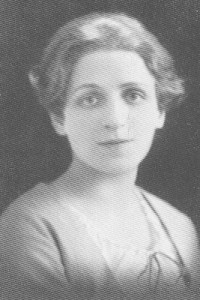 American poet and novelist Laura Riding was born in New York at the beginning of 1901. She reached poetic maturity earlier than many of her compatriots, publishing a lengthy 500 page work of collected poems when she was still in her 30s but would renounce poetry altogether some ten years later.
American poet and novelist Laura Riding was born in New York at the beginning of 1901. She reached poetic maturity earlier than many of her compatriots, publishing a lengthy 500 page work of collected poems when she was still in her 30s but would renounce poetry altogether some ten years later.
Riding was brought up by Jewish parents who originally came to the US from Austria, and she received a good education during childhood. She was just 19 years old when she married her professor, Louis Gottschalk, whilst studying at Cornell University.
Riding began writing poetry early and quickly came to the attention of the Fugitives, a group poets and critics who published works for a magazine of the same name. These included the likes of Crowe Ransom and Robert Penn Warren. Riding’s first poem appeared in their magazine The Fugitive in 1923 which led to the group giving her the Nashville Poetry Prize a year later. In 1925, she divorced Gottschalk and moved back to New York City where she got to know a number of writers of the time including Hart Crane who wrote The Bridge.
Riding published her first collection The Close Chaplet in 1926 and provided clear examples of her unique ability with her chosen style of free form poetry. She would often explore gender roles but her work has been accused of being difficult to read. Indeed, it has also been hard to find on occasion because she maintained that her verses should not appear in anthologies. Riding is thought to have tried to kill herself in 1929 after a romantic liaison went wrong whilst in England.

After this turning point, Riding made her first halting steps into exploring death and produced a number of important works including Twenty Poems Less in 1930. She formed a deep relationship with Robert Graves whilst in London and they moved to Majorca where they continued a productive artistic collaboration with the culmination, for Riding, being the publication of Collected Poems in 1938. Her most well-known fictional work was Lives of Wives which was published in 1939.
When the Spanish Civil War broke out, Graves and Riding left for America but their relationship was beginning to founder. They went their separate ways a few months later and Riding married Schuyler B. Jackson, finally settling in Florida where she would stay for the rest of her days. At the time, in 1941, Riding made the decision to give up poetry for good and worked with her husband to produce a dictionary about the meaning of language.

It wasn’t until nearly 20 years later that Riding finally began to come out of the shadows publishing works such as The Telling in 1964 and It Has Taken Long some ten years later. In the end Riding believed that poetry was inadequate to express what she felt which was why she had renounced the form so singularly in the 1940s. Her husband died in 1968, but Riding continued to publish prose works right up until her death in 1991. She received a number of prizes including the Bollingen Award for her contribution to poetry over her lifetime.

